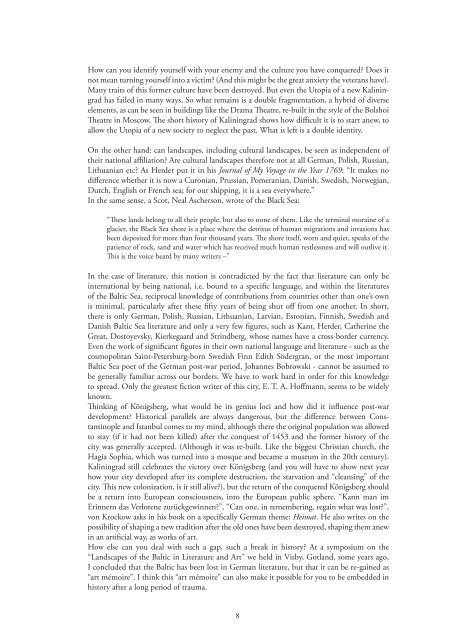BALTIC MEETINGS - Baltic Writers Council
BALTIC MEETINGS - Baltic Writers Council
BALTIC MEETINGS - Baltic Writers Council
You also want an ePaper? Increase the reach of your titles
YUMPU automatically turns print PDFs into web optimized ePapers that Google loves.
How can you identify yourself with your enemy and the culture you have conquered? Does it<br />
not mean turning yourself into a victim? (And this might be the great anxiety the veterans have).<br />
Many traits of this former culture have been destroyed. But even the Utopia of a new Kaliningrad<br />
has failed in many ways. So what remains is a double fragmentation, a hybrid of diverse<br />
elements, as can be seen in buildings like the Drama eatre, re-built in the style of the Bolshoi<br />
eatre in Moscow. e short history of Kaliningrad shows how difficult it is to start anew, to<br />
allow the Utopia of a new society to neglect the past. What is left is a double identity.<br />
On the other hand: can landscapes, including cultural landscapes, be seen as independent of<br />
their national affiliation? Are cultural landscapes therefore not at all German, Polish, Russian,<br />
Lithuanian etc? As Herder put it in his Journal of My Voyage in the Year 1769: “It makes no<br />
difference whether it is now a Curonian, Prussian, Pomeranian, Danish, Swedish, Norwegian,<br />
Dutch, English or French sea; for our shipping, it is a sea everywhere.”<br />
In the same sense, a Scot, Neal Ascherson, wrote of the Black Sea:<br />
“ese lands belong to all their people, but also to none of them. Like the terminal moraine of a<br />
glacier, the Black Sea shore is a place where the detritus of human migrations and invasions has<br />
been deposited for more than four thousand years. e shore itself, worn and quiet, speaks of the<br />
patience of rock, sand and water which has received much human restlessness and will outlive it.<br />
is is the voice heard by many writers –”<br />
In the case of literature, this notion is contradicted by the fact that literature can only be<br />
international by being national, i.e. bound to a specific language, and within the literatures<br />
of the <strong>Baltic</strong> Sea, reciprocal knowledge of contributions from countries other than one’s own<br />
is minimal, particularly after these fifty years of being shut off from one another. In short,<br />
there is only German, Polish, Russian, Lithuanian, Latvian, Estonian, Finnish, Swedish and<br />
Danish <strong>Baltic</strong> Sea literature and only a very few figures, such as Kant, Herder, Catherine the<br />
Great, Dostoyevsky, Kierkegaard and Strindberg, whose names have a cross-border currency.<br />
Even the work of significant figures in their own national language and literature - such as the<br />
cosmopolitan Saint-Petersburg-born Swedish Finn Edith Södergran, or the most important<br />
<strong>Baltic</strong> Sea poet of the German post-war period, Johannes Bobrowski - cannot be assumed to<br />
be generally familiar across our borders. We have to work hard in order for this knowledge<br />
to spread. Only the greatest fiction writer of this city, E. T. A. Hoffmann, seems to be widely<br />
known.<br />
inking of Königsberg, what would be its genius loci and how did it influence post-war<br />
development? Historical parallels are always dangerous, but the difference between Constantinople<br />
and Istanbul comes to my mind, although there the original population was allowed<br />
to stay (if it had not been killed) after the conquest of 1453 and the former history of the<br />
city was generally accepted. (Although it was re-built. Like the biggest Christian church, the<br />
Hagia Sophia, which was turned into a mosque and became a museum in the 20th century).<br />
Kaliningrad still celebrates the victory over Königsberg (and you will have to show next year<br />
how your city developed after its complete destruction, the starvation and “cleansing” of the<br />
city. is new colonization, is it still alive?), but the return of the conquered Königsberg should<br />
be a return into European consciousness, into the European public sphere. “Kann man im<br />
Erinnern das Verlorene zurückgewinnen?”, “Can one, in remembering, regain what was lost?”,<br />
von Krockow asks in his book on a specifically German theme: Heimat. He also writes on the<br />
possibility of shaping a new tradition after the old ones have been destroyed, shaping them anew<br />
in an artificial way, as works of art.<br />
How else can you deal with such a gap, such a break in history? At a symposium on the<br />
“Landscapes of the <strong>Baltic</strong> in Literature and Art” we held in Visby, Gotland, some years ago,<br />
I concluded that the <strong>Baltic</strong> has been lost in German literature, but that it can be re-gained as<br />
“art mémoire”. I think this “art mémoire” can also make it possible for you to be embedded in<br />
history after a long period of trauma.<br />
8


